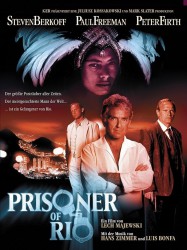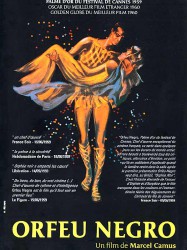Breno Mello est un Acteur Brésilien né le 7 septembre 1931 à Porto Alegre (Bresil)

Breno Mello (September 7, 1931 – July 11, 2008) was a Brazilian athlete and actor. He is primarily known for playing the title role in the 1959 film Orfeu Negro (Black Orpheus).
The film reinterpreted the Orpheus myth against the backdrop of the poverty of the Brazilian working class and Brazil's famous Carnaval. The film made extensive use of bossa nova music, including now famous songs such as "A Felicidade" and "Manhã de Carnaval" (also known as "A Day in the Life of a Fool"), which were sung by the character of Orfeu. While Mello acted the part of Orfeu, his singing voice was dubbed by Agostinho dos Santos.
Orfeu was the most successful role of Mello's acting career. Reviews of his performance, however, are mixed. Bosley Crowther, reviewing the film for the New York Times in 1959, criticized his acting, stating "He performs the role more as a dancer than as an actor trying to show a man in love." On the other hand, Mello's performance has also been described as natural, reflecting real talent. Hollis Alpert, writing for the Saturday Review, called the actors' performances "admirable." Critics agreed that Mello looked the part: the otherwise negative review of Mello in The New York Times stated that he was "a handsome, virile Orpheus who glistens when covered with sweat.”
The film won the Palme d'Or at the 1959 Cannes Film Festival, as well as the 1960 Academy Award for Best Foreign Language Film, and the 1960 Golden Globe Award for Best Foreign Film. Mello was not part of the group representing the film for these awards. However, more than 40 years later, Mello attended the Cannes festival at the expense of the Brazilian government, and with the invitation of the producers of the 2005 documentary "In Search of Black Orpheus" (Em Busca do Orfeu negro / À la recherche d'Orfeu Negro (Brasil/França, 2005)), by Bernard Tournois and René Letzgus.
Mello appeared in several other films, including Rata de puerto (1963), Os Vencidos (1963), O Santo Módico (1964), O Negrinho do Pastoreio (1973) and Prisoner of Rio (1988). However, Mello was unable to maintain regular employment as an actor. Shortly before his death, Mello gave his view of why his acting career had not been more successful, saying: "Brazilian cinema at that time didn't have financing. I couldn't support myself with movies, and so, I went back to soccer." ["O cinema brasileiro não tinha financiamento na época. Não podia me sustentar com o cinema e, por isso, retornei ao futebol."] In 2004, Mello returned to film, appearing in the documentary In Search of Black Orpheus (in which he portrayed himself) to talk about the impact that the movie Black Orpheus had on the world of Brazilian music, such as Bossa Nova and samba. However, the filmmakers of this documentary had to search for Mello in order to secure his participation in the film.
Mello also lived in Florianópolis, Santa Catarina, where he met Amelina Santos Corrêa, also known as Mana. He had his youngest daughter, Letícia, with her. Mello died in his hometown of Porto Alegre, Brazil, at the age of 76 years on July 11, 2008, from a heart attack. His Black Orpheus co-star, American-born actress Marpessa Dawn, died 42 days later of a heart attack, in Paris, France. Dawn was 74.
Source : Wikidata
Breno Mello

- Infos
- Photos
- Meilleurs films
- Famille
- Personnages
- Récompenses
Nom de naissance Breno Mello
Nationalité Bresil
Naissance 7 septembre 1931 à Porto Alegre (Bresil)
Mort 11 juillet 2008 (à 76 ans) à Rio Grande do Sul (Bresil)
Nationalité Bresil
Naissance 7 septembre 1931 à Porto Alegre (Bresil)
Mort 11 juillet 2008 (à 76 ans) à Rio Grande do Sul (Bresil)
Biographie
Mello was born in Porto Alegre, the capital of Rio Grande do Sul, a state of Southern Brazil. In the beginning of his career, Breno Mello was a soccer player. He played soccer for Renner and Fluminense, and also for Santos FC, where he met Pelé. Mello was walking in Rio de Janeiro, when director Marcel Camus stopped him and asked if he would like to be in a film. Camus cast Mello to star in the classic 1959 film Orfeu Negro (Black Orpheus), in which Mello played the role of Orfeu. Camus was "fascinated" by Mello's physical beauty, which was an essential aspect of the character of Orfeu envisioned by Camus.The film reinterpreted the Orpheus myth against the backdrop of the poverty of the Brazilian working class and Brazil's famous Carnaval. The film made extensive use of bossa nova music, including now famous songs such as "A Felicidade" and "Manhã de Carnaval" (also known as "A Day in the Life of a Fool"), which were sung by the character of Orfeu. While Mello acted the part of Orfeu, his singing voice was dubbed by Agostinho dos Santos.
Orfeu was the most successful role of Mello's acting career. Reviews of his performance, however, are mixed. Bosley Crowther, reviewing the film for the New York Times in 1959, criticized his acting, stating "He performs the role more as a dancer than as an actor trying to show a man in love." On the other hand, Mello's performance has also been described as natural, reflecting real talent. Hollis Alpert, writing for the Saturday Review, called the actors' performances "admirable." Critics agreed that Mello looked the part: the otherwise negative review of Mello in The New York Times stated that he was "a handsome, virile Orpheus who glistens when covered with sweat.”
The film won the Palme d'Or at the 1959 Cannes Film Festival, as well as the 1960 Academy Award for Best Foreign Language Film, and the 1960 Golden Globe Award for Best Foreign Film. Mello was not part of the group representing the film for these awards. However, more than 40 years later, Mello attended the Cannes festival at the expense of the Brazilian government, and with the invitation of the producers of the 2005 documentary "In Search of Black Orpheus" (Em Busca do Orfeu negro / À la recherche d'Orfeu Negro (Brasil/França, 2005)), by Bernard Tournois and René Letzgus.
Mello appeared in several other films, including Rata de puerto (1963), Os Vencidos (1963), O Santo Módico (1964), O Negrinho do Pastoreio (1973) and Prisoner of Rio (1988). However, Mello was unable to maintain regular employment as an actor. Shortly before his death, Mello gave his view of why his acting career had not been more successful, saying: "Brazilian cinema at that time didn't have financing. I couldn't support myself with movies, and so, I went back to soccer." ["O cinema brasileiro não tinha financiamento na época. Não podia me sustentar com o cinema e, por isso, retornei ao futebol."] In 2004, Mello returned to film, appearing in the documentary In Search of Black Orpheus (in which he portrayed himself) to talk about the impact that the movie Black Orpheus had on the world of Brazilian music, such as Bossa Nova and samba. However, the filmmakers of this documentary had to search for Mello in order to secure his participation in the film.
Mello also lived in Florianópolis, Santa Catarina, where he met Amelina Santos Corrêa, also known as Mana. He had his youngest daughter, Letícia, with her. Mello died in his hometown of Porto Alegre, Brazil, at the age of 76 years on July 11, 2008, from a heart attack. His Black Orpheus co-star, American-born actress Marpessa Dawn, died 42 days later of a heart attack, in Paris, France. Dawn was 74.
Ses meilleurs films
Le plus souvent avec
Filmographie de Breno Mello (2 films)
Acteur

Prisoner of Rio (1988)
, 1h44Réalisé par Lech Majewski
Origine Royaume-uni
Genres Drame, Thriller
Acteurs Steven Berkoff, Paul Freeman, Peter Firth, Florinda Bolkan, Desmond Llewelyn, José Wilker
Rôle Silencio
Note56%





After escaping from Wandsworth prison for his part in the Great Train Robbery, Ronald "Ronnie" Biggs (Paul Freeman) goes on the run to Rio de Janeiro and becomes the world's most wanted man. Hot on his trail however is committed copper Jack McFarland (Steven Berkoff), who will stop at nothing to bring him back to justice - even if that means stepping outside the law.

Orfeu Negro (1959)
, 1h45Réalisé par Marcel Camus
Origine Bresil
Genres Drame, Science-fiction, Comédie, Comédie dramatique, Fantasy, Musical, Romance
Thèmes Carnaval, La musique, Mythologie, Théâtre, Musique, Mythologie grecque, Adaptation d'une pièce de théâtre, Mythologie gréco-romaine
Acteurs Breno Mello, Marpessa Dawn, Léa Garcia, Marcel Camus
Rôle Orfeo
Note73%





Ce film revisite le mythe d'Orphée et d'Eurydice en le transposant de Thrace à Rio de Janeiro pendant le carnaval. Orfeo est conducteur de tramway à Rio. Eurydice est une jeune campagnarde. Elle est issue de la communauté noire brésilienne, comme lui. Menacée par un inconnu, elle s'est réfugiée chez sa cousine Sérafina. Ils se rencontrent à Rio la veille du carnaval. Pour éviter la jalousie de Mira, la fiancée d'Orfeo, Serafina prête son déguisement à Eurydice. Ils vont s'aimer au milieu des festivités d'une ville en liesse. Mais le lendemain, elle est démasquée.
 Connexion
Connexion


